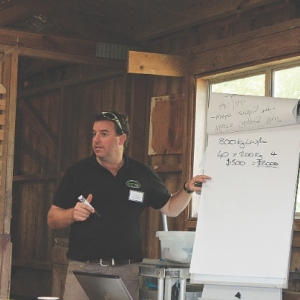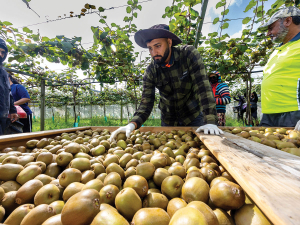About 30 farmers attended the “practical and profitable cattle systems” day on Daniel and Nicola Berger’s farm at Ahuroa, Northland where speakers explained how a tightly subdivided 10ha block could generate twice the income it would under a traditional grazing system.
The subdivision allows at least twice the number of stock to be carried, typically in grazing “cells” as small as 0.1ha, up to 0.8ha. Stock graze a cell for no longer than two days before moving on.
Northland AgFirst consultant Gareth Baynham says the result is 600-1000kg/ha/year liveweight gain were previously 300-400kg/ha/year would have been produced. What’s more, it’s without heavy use of fertiliser or any other soil fertility boosters.
Nutrients passing through the animal are better recycled in the pasture, so more grass grows, and the rotational grazing allows ryegrass to grow at or very close to its maximum potential.
Baynham explains that’s achieved when ryegrass has at least three leaves. Non-intensive stock rotation won’t always allow pasture to achieve that optimum growth stage, especially in winter when it can take 50-70 days to completely recover from a previous grazing.
Subdivision and cell grazing, or using the TechnoGrazing system, allows stock to be rotated at a pace that enables good grass growth.
With Techno’ systems, paddocks are divided into corridors and stock work along corridors then cross into the next and work their way back, and so on.
Northland Ballance Farm Environment Awards supreme winners in 2009, Peter and Pam Kelly, from Omamari Beach, relayed to the BLNZ field day how they had increased stock numbers and productivity by 50% with the Techno’ system.
Lower Northland monitor farmers Daniel and Nicola Berger achieved a similar gain when they trialled a cell system across 5ha. Despite running twice as many stock units on the area, they maintained liveweight gains, which ranged from 0.75kg/day to 1.23kg/day.
That result’s seen them subdivide another 5ha paddock into cells this year.
Baynham says initial infrastructure costs are not high and can be recovered in a year.
“Generally systems cost between $100 and $300 to set up and normally farmers get 50% more production off those systems.”
Including a reticulated water system may add $100-$200/ha, but brings its own benefits, especially in a drought, he adds.
Baynham says time constraints are often the main reason farms give for not using such subdivision systems, fearing they’ll be spending all day shifting stock.
However, Kaipara farmer and Kiwitech sales representative Ron McCloy told the field day technology like the Kiwtech’s temporary and semi-permanent fencing means fences can be driven over without stopping, and stock shifted swiftly without gates. It means he’s able to do all the stockwork on his farm within a couple of hours.
“I drive through 40-50 fences a day and don’t even really think about it.”

















